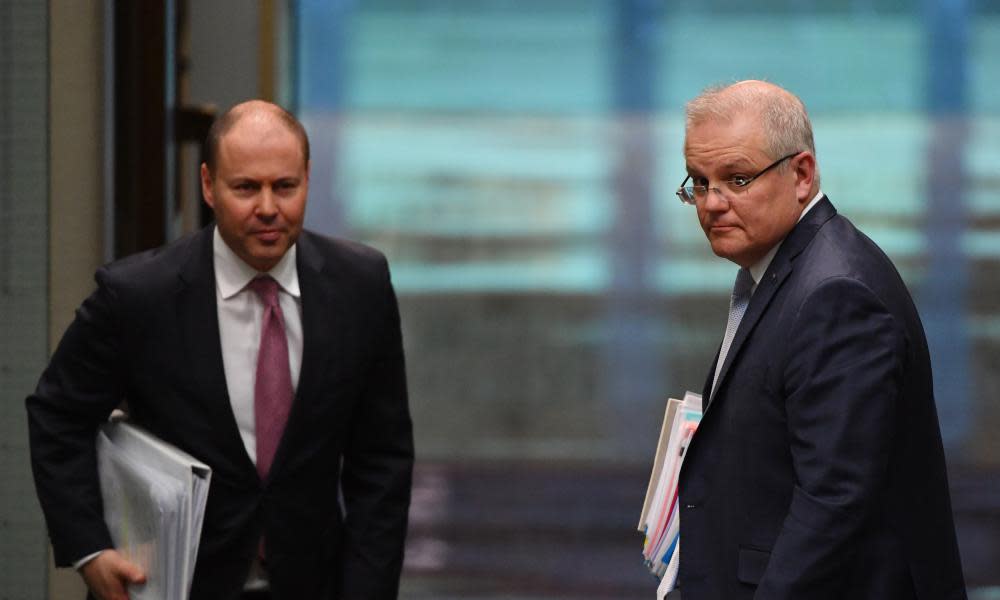Frydenberg rules out 'wholesale changes' to jobkeeper despite $60bn underspend

The Morrison government has ruled out “wholesale changes” to the jobkeeper wage subsidy after the revelation it will cost $60bn less than expected, but left the door open to “further support” to the hardest hit industries, such as tourism.
The revelation on Friday that the wage subsidy covers 3m fewer workers than expected has opened the government up to calls to extend eligibility, but the treasurer, Josh Frydenberg, has suggested it would prefer to bank the savings by raising less debt.
On Monday Frydenberg also confirmed that – despite the wage subsidy being designed to keep workers attached to their jobs – jobkeeper does not prevent an employer making employees redundant.
Related: Scott Morrison dismisses calls for Josh Frydenberg to front Covid-19 inquiry over jobkeeper
On 2GB radio, Frydenberg was asked about a report that companies are still making workers redundant after claiming the $1,500 fortnightly wage subsidy.
Frydenberg noted the government had “never said” businesses can’t make workers redundant after applying for jobkeeper but he could “not see” why they would do so.
“Businesses right around the country should be endeavouring to keep their staff on, if they are eligible under jobkeeper, then they would be paying those $1,500 payments directly to the staff member,” he said.
Frydenberg said businesses claiming the jobkeeper payment “need to have paid those employees that $1,500 a fortnight amount” and to report redundancies to the Australian Taxation Office. “If they have made people redundant, they are not entitled to get further payments under jobkeeper from the government.”
Frydenberg put a positive spin on the dramatic recalculation of the wage subsidy, arguing the $70bn cost of jobkeeper is “all borrowed money” and the $60bn underspend was money the government would now not have to raise in debt markets.
He explained that jobkeeper had suffered from two separate errors: first, a projection by Treasury that 6.5m workers would be covered at a cost of $130bn, which has proved inaccurate due to better than expected health results and easing of restrictions; and second, a miscounting of the number of employees of enrolled businesses due to some misinterpreting forms.
• Sign up to receive the top stories from Guardian Australia every morning
Labor has called for the jobkeeper wage subsidy to be extended to casuals with less than 12 months’ service, and neglected industries including universities, arts and entertainment.
The Australian Council of Social Services and Council of Small Business Organisations Australia renewed calls to extend jobkeeper to temporary migrants.
The Australian Industry Group has written to the government suggesting the payment should be extended to “low-margin businesses” that don’t meet the 30% downturn requirement but are nevertheless under financial stress.
It also believes independent business units or medium-sized businesses in a larger group should be judged on the same basis as their competitors, with access to the easier 30% downturn threshold rather than the larger 50% barrier for those earning more than $1bn.
Related: Jobkeeper payment: check your eligibility, how much it's worth and when it should start getting paid
Liberal MP Craig Kelly told Guardian Australia the accounting error was “pretty good news” because it meant the budget was “$60bn better off”.
Kelly said when restrictions were expected to last six months it was “fair enough” to provide a payment of that duration, but with industries including beauty salons back at work “absolutely flat-stick … it’s difficult to see the argument for those businesses, that jobkeeper should continue for them”.
“If your turnover has been restored – and you’re back to normal – should you still be getting the jobkeeper payments? It’s a debate that needs to be had.”
“Other industries may be out of action for longer than six months, such as the tourism industry,” he said, suggesting the payment should be extended beyond September for those “still struggling”.
Frydenberg told ABC News the government hasn’t “got plans to make wholesale changes”. He noted the government had already given a funding guarantee to universities and shorter-term casuals are eligible for jobseeker unemployment benefits.
Frydenberg said the jobkeeper payment will be reviewed in June, which would consider “how it’s been implemented in various sectors”.
“The tourism sector could be one sector in need of further support. That’s what we’ll look at in the context of the economic situation at the time. You’ll continue to see our international borders closed for some time.
“It’s estimated some 850,000 people will be back in work as a result of those three stages of restrictions being lifted. That’s the way to get people back into a job.”
Labor’s shadow treasurer, Jim Chalmers, blasted the $60bn jobkeeper forecasting error as “the biggest error ever made in a budget by any government at any point in Australian history”.
“That’s catastrophic for hundreds of thousands of Australian workers who were excluded from the scheme on the basis the program was full,” he said.
“And I think that’s an admission of failure that the objectives of this program, to keep as many people attached to their employer as possible, are not being met.”


